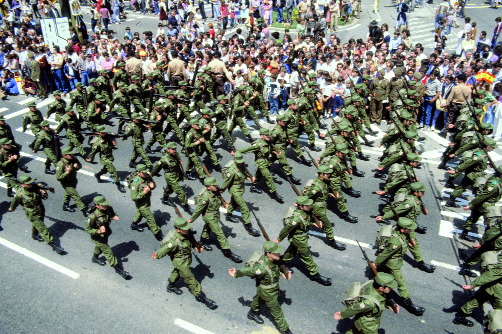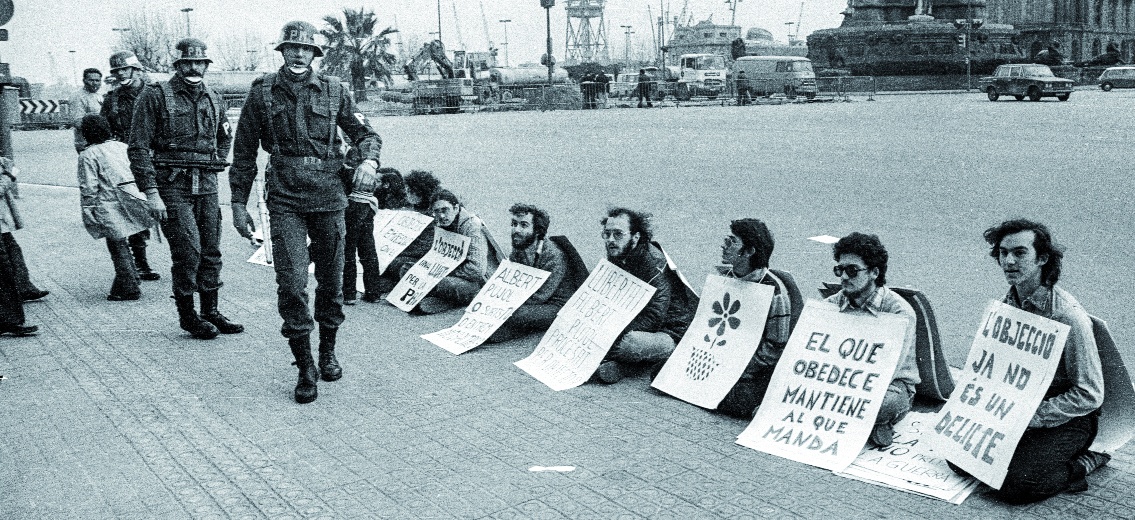The Spanish army has a stigma that it earned throughout the 20th century, and one that will be difficult to reverse. The possible virtues of the military are hyperbolically praised by a cardboard rhetoric, and refuted by the abuses committed in the name of discipline, obedience and honour.

Parade for the Día de las Fuerzas Armadas [‘Armed Forces Day’] along Avinguda Diagonal (1981).
Photo: Robert Ramos
Not enough is said about the dirty trick of making those young men who had fought on the Republican side do compulsory military service for a longer period than usual. While the victors were exempt, the vanquished suffered the disciplinary and ideological ridicule of the same army that had defeated them. Between the war and the added service, a large fraction of young Catalans lost five, six or seven years of their lives. The military stole their youth.
My father, who was part of the first group of underage Republican recruits known as the “Quinta del Biberó”, was punished by having to do service in Castile. Upon reaching the train station in Valladolid, an official warned: “I’ll kill the first person I hear speaking Catalan!” The anti-Catalan hate, the threat from an armed authority who watches you and accuses you, the supremacy of the military class above justice and democracy, the fear generated by repressive bodies – policy, army, judiciary, hostile officials, etc. – that were judge and jury: I experienced all of this during my childhood and youth.
I did the university militias, which were system of doing military service in instalments to avoid interrupting your studies. It was 1970, not long after the protests of May 1968 that had the political and military leadership in constant hysteria. The youthful masses, especially students, were dangerous. Still dressed as civilians and with the beards and dishevelled hair of the era, they let us know that “you can’t even blink standing at attention” and, in this catatonic posture, they read us some extracts from the code of military justice in which the phrase “will be executed” was repeated. It was a compulsory procedure and a warning: we’ve really got you by the you-know-what.
We continued our studies and living civilian life, but with a period of military service to complete and, therefore, subject to military jurisdiction. If they caught you at a protest or with so-called subversive propaganda, you would end up before a military council, which is the nice name that military trials went by. Or they would send you to do your military service in holy hellholes in retaliation. You were susceptible to it at any time; they could grab you and accuse you of anything. Especially at the old University of Barcelona where I studied and where the police – the infamous armed police of the dictatorship – were constantly at hand to tear down posters, break up an assembly or just out of routine. They would lash out and make arrests without rhyme or reason. No one was safe and for those of us who were halfway through our military service, they always had us by the throat. Dictatorships are based on that: sowing fear.
I did military service that was as ridiculous, useless and discredited as that of the previous generations, but with a new global factor. A youth revolt of university riots broke out around the world in the 1960s and ’70s, movements supporting civil rights and alternative lifestyles which were anti-authoritarian, and an outright rejection of militarism. Protest songs condemned the war in Vietnam and spread the desire for pacifism. I still did my military service with the contradiction of singing the infantry anthem – necrophilous and over the top, like all military anthems – every Saturday before leaving with permission and singing with friends and at folk festivals, songs like Diguem no, Soldat universal, Blowin’ in the wind and Le déserteur. We queued up at arthouse cinemas to watch anti-militarist films. With a gun in your hands you felt like an enemy of the people and you wondered, if the need arose, whether you would obey orders to fire against the ideals of peace and freedom.

Anti-military demonstration in front of the Military Government at the end of La Rambla, calling for the freedom of conscientious objectors and opponents held in prison; 6 March 1979.
Photo: Robert Ramos
Military service was protested by the next generation. I remember the name of Pepe Beúnza, a brave pioneer of a conscientious objection that years later would make anti-militarism visible with movements such as Mili KK that fought in an uninhibited way against military interference in the lives of young lads (kidnapping, they called it, and rightly so). Until military service stopped being compulsory. The situation was unsustainable; no one wanted to know anything about the army, and even less about an army that was so corrupt.
Before the Minister of Defence Narcís Serra modernised the armed forces with a completely new and professional organisation, the old, totalitarian military hierarchy had democracy up against the wall. In fact, the Constitution was drafted with bayonets at the neck. When it was advised to subordinate the army to civilian authority, the political right inherited the ultra-Spanish discourse – stale, imperious, intolerant, standardising, clearly pro-Franco – and leaned towards the far-right instead of becoming the comparable right of a European democracy that Spain has never had.
Today’s military commanders are men – and the odd woman – with university studies, who are well-prepared intellectually and theoretically committed to democratic values. They lead a reduced troop of a few nationals with a calling, one that accepts Hispano-Americans who want to become Spanish citizens. Ecuadorians, Bolivians, Panamanians and Guatemalans are obedient soldiers who sing whatever they make them sing and swear whatever they make them swear. They made me swear too that I would give my life to defend a flag that does not defend me, but instead attacks me and annoys me. What the soldiers yelled during the final years of compulsory service makes more sense. When they were encouraged with the cry of “Viva España!” (“Long live Spain!”), instead of replying with “Viva!” they shouted “Birra!” (“Beer!”).
The possible virtues of the military – altruism, sacrifice, loyalty, moral rectitude, camaraderie, spirit of overcoming, commitment to peace, etc. – are hyperbolically praised by an inflated cardboard rhetoric, and refuted by the abuses committed in the name of discipline, obedience and honour. It is difficult to stop them because soldiers operate autonomously: they are protected with legal walls and prerogatives outside of civil society, i.e. outside of society. Barracks today are still havens for the abuse of authority, hazing, blackmail between soldiers, humiliation… And they are bastions of rampant homophobia and male chauvinism.
When Rafael Nadal was eliminated from the Olympics in Rio de Janeiro, the Spanish army posted a memorable tweet in support of the tennis player, taken from Camilo José Cela’s 1949 tribute to the deplorable fascist General Millán Astray: “La guerra no es triste porque levanta las almas, porque nos enseña que fuera de la Bandera [sic, in capitals], nada, ni aun la vida, importa. Gracias, Rafa” (“War is not sad because it lifts spirits, because it teaches us that beyond the Flag, nothing, not even life, matters. Thanks, Rafa”). The untimely revival of the old rhetoric, with hints of the Francoist motto of Una, grande y libre (One, great and free), reveals that there are still traces of a retro military discourse. However, it caused such uproar that the army deleted the tweet and apologised. The fact that the army felt obliged to apologise is the result of a profound social change.
In conclusion: 1) the Spanish army has a stigma that it earned itself over the course of the 20th century, at least, and that will be difficult to reverse, and 2) society has a strong anti-war sentiment. People today are not for parades, uniforms, metallic braiding, medals, anthems, harangues or Flags with a capital F. There are more important things. Birra!


